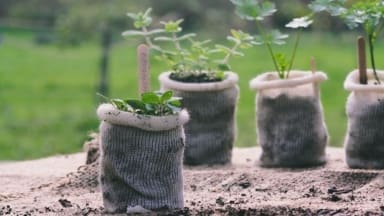
Wool is a natural, cyclical product which grows annually and needs clipping, but unfortunately is not currently valued by the UK industry. Ongoing development of synthetic fibres, supply chain consolidation and cheaper imports continues to put downward pressure on the market. Fleece prices have tumbled from £14 per kg in the 1950s to less than 87p for the same amount today with farmers getting a return of as little as 26p per kg over the last few years.
News of farmers resorting to burning their fleece are on the rise, because sadly the low price of natural wool has made this product almost worthless. During Covid, sheep fleeces were burnt by the thousand because the carpet and wool factories shut down, yet it has viable potential as a medium for compost and/or other innovations.
Wool innovations seen at the recent Garden Press Event, indicate that gardeners could provide farmers a potential new market for their wool. Inversely, the wool industry may be able to help ease our industry off our plastic pot and peat addiction.
- Wool pots: Manufactured using as 100% unloved raw wool and endorsed by the Eden Project, wool pots (pictured) could provide a biodegradable and sustainable alternative to plastic plant pots. Made to the size of a 9cm pot (stretch to 13cm), the wool pots function just as a regular pot, which can be filled with compost for sowing or planting. When watered, the wool will wick up and maintain the moisture, and helps draw the roots downwards. When ready to plant, the plant is to be planted in its pot, with the pot edge proud of the soil. The pot will breakdown within 6-7 weeks, providing plant nutrients and its woollen collar is said to prevent slug damage. Handling is a little different as the wool pots are basically a beautifully knitted little sock and therefore take the form of (squidgy) compost. The tight knit holds the compost well, without leakage but if commercial nurseries wish to use them, handling will require thought. Initially Wool Pots may provide an option for posting or direct sales to consumers where they can swapped out, preventing further distribution of additional plastic pots. They certainly look good and their sustainability will certainly endear them to consumers.
- Hortiwool: Multi-use wool pads which provide an alternative to synthetic capillary matting, hanging baskets liners, plant root balls, micro-greens growing, slug protection and so forth. Made from 100% wool and sourced from an array of British sheep farms, the wool pads harness the power of wool in terms of their natural insulation, ability to retain moisture, repel slugs and snails and break down in the soil adding carbon nutrients for the benefit of plants. Hortiwool provides a sustainable, low carbon and versatile alternative for gardeners.
- Wool compost™ by Dalefoot Compost. Sheep’s wool is known to offer many benefits when used in a mixture as compost or mulch, providing an effective and more sustainable peat-free alternative. Dalefoot’s compost provides a good, eco-friendly peat-free garden compost that mixes bracken and sheep’s wool to help retain water while releasing nutrients to feed flowers, fruit and vegetables throughout the growing season. The idea originated from old gardening books that talked of wool’s natural ability to hold water to itself, and provide long term nutrient release – wool is still famously used in the ‘Rhubarb Triangle’ of Yorkshire.

